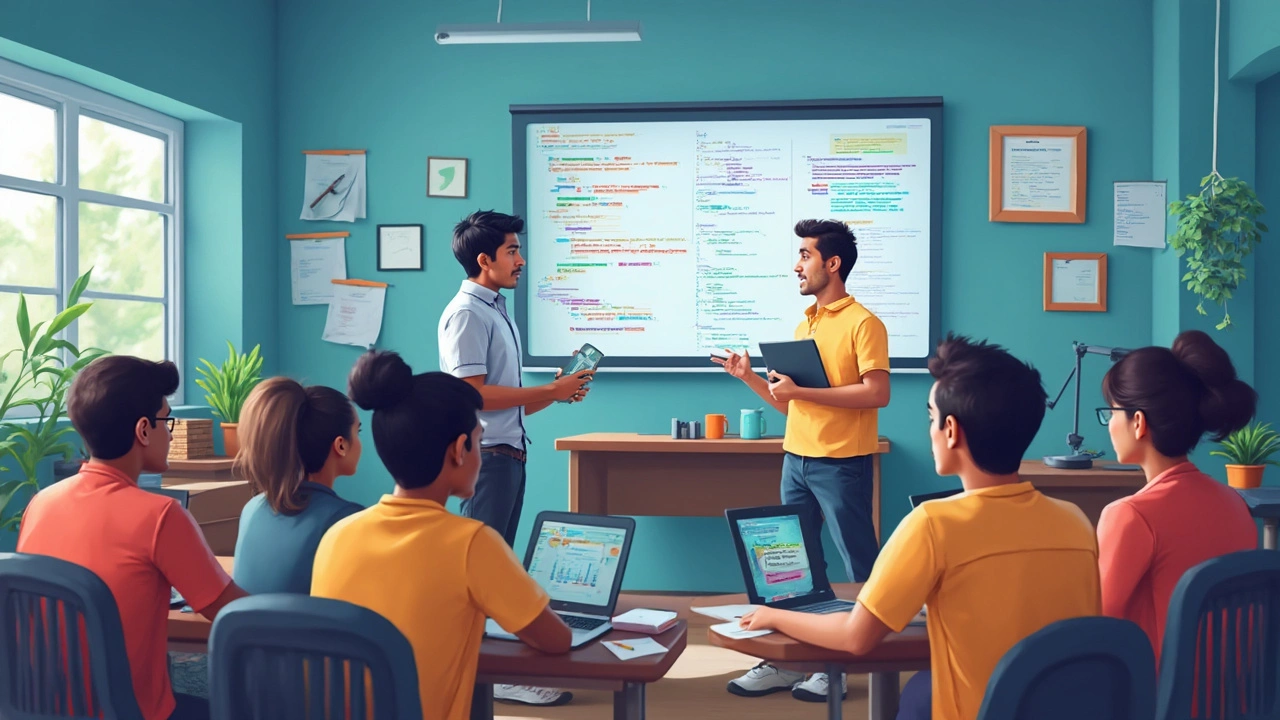Can I Learn Coding in 3 Months?
 Apr, 1 2025
Apr, 1 2025
So, you're wondering if you can learn coding in just three months? It's a bold step, but definitely doable with the right mindset, tools, and plan. Picture this: by the end of three months, you could be building your own apps or diving into the world of web development. Crazy, right?
First things first, the key is having the right attitude. You've got to treat coding like a muscle you're flexing every day. Dedicate consistent time to learn and practice. Now, you're probably thinking, "What languages should I focus on?" Good question! Languages like JavaScript, Python, and HTML/CSS are a great starting point. They’re versatile and widely used across multiple tech fields.
The internet is a treasure trove of resources, but finding the right ones is crucial. Platforms like Codecademy, Coursera, and freeCodeCamp offer structured courses that break down complex concepts into bite-sized pieces. Plus, many of these have communities where you can share progress, ask questions, and get feedback.
- The Learning Mindset
- Essential Languages and Technologies
- Effective Resources and Tools
- Practice Makes Perfect
- Challenges and How to Overcome Them
The Learning Mindset
Alright, so you want to learn coding quick, like in three months quick. The trick here really is in the mindset. It's kind of like training for a marathon, but instead of running, you're crunching code. So what's the game plan?
First off, consistency is your best pal. Make a schedule and stick to it. It doesn't have to be crazy. Even two hours a day can do wonders if you're focused. Regular and consistent learning beats cramming any day.
Secondly, don’t shy away from mistakes. You're going to run into bugs and maybe even crash a few programs—it's all part of the process. Embrace it! Debugging is a learning opportunity. The more you mess up (and then fix it), the more you'll understand the inner workings of your code.
Being goal-oriented can also help. Set realistic milestones. Maybe it’s completing a basic project each week or understanding a new concept every few days. This not only keeps you motivated but also gives you a tangible sense of achievement.
- Stay Curious: Don’t stop at just learning the “how”; dig into the “why” as well. Why are certain coding practices preferred? Why does your code sometimes break? This curiosity will deepen your understanding.
- Stay Organized: Keep your notes, code snippets, and resources in order. A chaotic workspace can lead to a chaotic mind.
And hey, don’t do it alone if you don’t have to. Join online communities or study groups. Share tips, solve problems together, and learn from each other's experiences. Coding is as much about collaboration as it is about solo problem-solving.
Remember, the right learning mindset isn’t about being a genius; it’s all about discipline, curiosity, and a willingness to face those pesky challenges head-on. Keep that attitude, and you'll find those three months might just be enough to set you on a solid programming path.
Essential Languages and Technologies
If you're aiming to get the most out of your three-month learn coding adventure, picking the right languages and technologies is key. It might feel overwhelming at first, but starting with some core programming languages can make all the difference.
Python is a fantastic language for beginners because it's easy to read and used in many fields like data science, artificial intelligence, and web development. Then there's JavaScript, which is mostly for making websites interactive and modern. If you're aiming for web development, learning HTML and CSS is a must as they form the backbone of web page structure and styling.
Once you're comfortable with these, consider diving into technologies like Git for version control. It's a crucial skill for collaborating on projects. Moreover, knowing basics of SQL is helpful if you plan to handle databases.
Here's a simple breakdown to guide you:
- Python: General-purpose, beginner-friendly, used in web apps, data analysis.
- JavaScript: For the web, makes sites interactive.
- HTML/CSS: Foundation of all web pages – structure and style.
- Git: Manage code versions, important for any coder.
- SQL: Talk to databases, super useful for data handling.
Starting with these essential tools can set a solid foundation, helping you adapt and learn other languages and technologies with ease later on. Remember, it's about building blocks; mastering the basics enables you to pick up new skills faster down the road.

Effective Resources and Tools
Diving into coding can feel overwhelming with all the resources out there, but picking the right ones will make your journey smoother. Let's break it down so you can get on the fast track to learning.
Coding platforms are your best friends here. Think of Codecademy, where you can start from the basics and gradually move to more complex projects. It's interactive, which means you get to practice right away instead of just reading boring theory. Also, check out freeCodeCamp, offering over 3,000 hours of free lessons covering everything from HTML to Python.
If you're more of a structured learner, platforms like Coursera and edX provide courses from top universities. You can even earn certificates to showcase your skills. Their courses often include projects that mimic real-world scenarios, helping you understand how theories apply in practice.
Now, let’s talk about some must-have tools that can amp up your coding game. First off, get familiar with a code editor like Visual Studio Code. It’s popular among developers because of its simplicity, and it’s packed with extensions to support different programming languages. Then there’s GitHub, where you can store your projects, collaborate with others, and even contribute to open-source projects.
Here's a quick tip: Join a coding community. Being part of a community can skyrocket your learning curve. Whether it's on Reddit, Stack Overflow, or joining local meetups, there's a wealth of support out there.
| Platform | Type | Languages Offered |
|---|---|---|
| Codecademy | Interactive | JavaScript, Python, Ruby, HTML |
| freeCodeCamp | Free, Self-paced | HTML/CSS, JavaScript, Databases |
| Coursera | Structured, University-based | Python, SQL, C++ |
These resources act as a bridge between knowledge and application. Remember, consistency in using them will help turn that massive hurdle of learning to code into a series of achievable steps.
Practice Makes Perfect
Alright, let's get real. No one aces coding overnight. It’s all about consistent practice. The more you code, the more you’ll understand, and the easier everything becomes. Got a programming concept you can't wrap your head around? Try building a small project focused on it. You'll see those ideas click into place.
Dive into online challenges. Websites like HackerRank, LeetCode, and Codewars are fantastic for testing your skills and learning new techniques. They offer problems ranging from beginner to expert levels, giving you a sense of progression and accomplishment.
Another trick? Document your journey. Keep a coding journal where you jot down what you've learned every day. It’s a powerful tool for reflection and tracking growth. Plus, consider joining coding communities on platforms like GitHub or Stack Overflow. Engaging with others will expose you to different viewpoints and best practices, and you might even make some friends!
If you like a bit of structure, following a bootcamp-style routine might suit you. Spend your days learning coding concepts in the morning, practicing in the afternoon, and reflecting on your progress in the evening. Set mini-deadlines to keep the momentum and celebrate the wins, no matter how small.
And hey, ever heard of the 10,000-hour rule? Don't sweat it! YouTube creator 'Next Level Tech' shared a more realistic view: with focused effort, you can build useful coding skills in as little as 100 hours. So break it down: aim for just an hour or two every day. It’s manageable and keeps stress levels low.
Remember, the goal isn't to become the next coding superstar in three months but to lay a solid foundation. Keep that keyboard busy, and watch how your skills grow like never before.

Challenges and How to Overcome Them
Taking on the challenge of learning to code in just three months can feel overwhelming. I mean, there's a lot to grasp, from syntax to debugging, right?
One major hurdle is the sheer volume of information. You might feel like you’re drowning in a sea of new concepts. The key is to break things down. Focus on one language first, like Python or JavaScript, and build a strong foundation. Once you're comfortable, branching out becomes a bit easier.
Then there’s the infamous imposter syndrome. Trust me, every coder experiences this at some point. Remind yourself that learning is a journey, and even seasoned pros encounter errors. Celebrate small wins, like successfully completing a module or solving a coding challenge. These wins keep the motivation up!
Time management is another biggie. Three months is short, so staying organized is crucial. Consider setting a daily schedule. It doesn’t have to be rigid, but allocating specific times for learning and practice sessions helps.
- Start your day with a quick review of what you learned yesterday.
- Dedicate blocks of uninterrupted time to dive deeper into complex topics.
- Use tools like Trello or Notion to track your progress.
Stuck algorithms can be terribly frustrating. To get past this, sometimes stepping away helps. When you return, try breaking the problem into smaller parts or explaining the problem to someone else, even if they're not a programming whiz.
Lastly, let’s talk about burnout. Coding marathons sound heroic but aren’t sustainable. Balance is key. Make sure to step away from your screen, get fresh air, or even just stretch every hour or so. Your brain will thank you!
Remember, the way to learn coding effectively in three months is not about racing through tutorials, but actively engaging with the material and reflecting on your growth. Take challenges in stride and don't hesitate to reach out to coding communities online; their support can be invaluable.